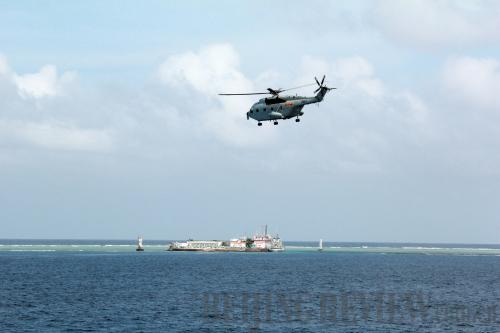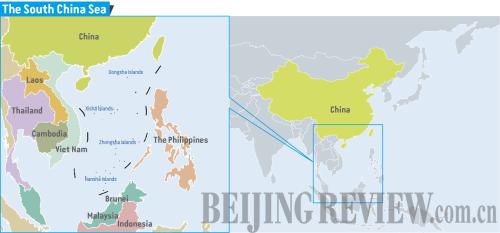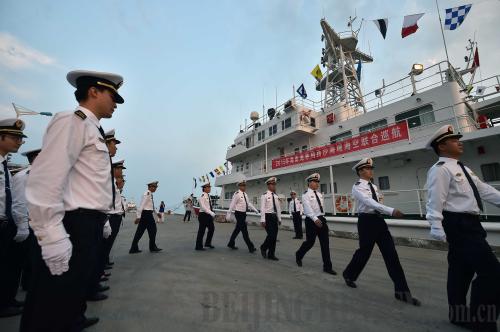|
 |
|
A Chinese helicopter patrols the South China Sea on January 25, 2014 (XINHUA) |
The Shangri-La Dialogue—a moniker that suggests the tranquil, snow-capped peaks of the Himalayas and the simplistic lifestyle of China's Tibet Autonomous Region. Names, however, can be deceiving.
The dialogue, a regional security summit held in Singapore in late May, became little more than a room full of tense officials after the United States flew a reconnaissance aircraft through Chinese airspace while transporting members of CNN's news crew.
The flyover, which took place above the waters surrounding China's Nansha Islands and was undertaken by a U.S. P-8 Poseidon aircraft, has sparked controversy internationally.
Information from China's National Defense Ministry shows that in recent weeks, the U.S. Navy has intensified surveillance operations over Chinese waters.
In recent years, the annual Shangri-La Dialogue has been filled with an air of discontent due to the Obama administration's Pivot to Asia strategy, as well as other countries in the region wishing to take advantage of the U.S. initiative to further their own interests and seize portions of China's sovereign territory. Last year, China became the target in a war of words as some other nations tried to bring bilateral maritime disputes into the international arena.
This year, with the United States attempting to draw attention to China's infrastructure projects on the Nansha Islands ahead of the summit, China unsurprisingly became a focus of the summit once more.
Nevertheless, many Chinese observers noted that U.S. criticisms of China's construction activities are both unfair and lacking a legal basis. These construction projects fall well within the scope of China's sovereignty. While the projects have some basic defense functions, they will be used for a variety of civilian purposes that will enable China to better meet its international responsibilities.
In addition, observers said that the move of the United States aimed to do nothing more than display its leadership and strength to its regional allies, so that it could further cement its dominance in the region.
Unfair criticism
In addition to U.S. Navy aircraft's close-in reconnaissance on Chinese islands, U.S. officials have increased the volume of their outbursts against China's construction. When giving a speech to young cadets from the U.S. Navy Academy recently, U.S. Vice President Joe Biden claimed that China is the destabilizing factor in the South China Sea and that the United States should keep peace in the region "as it has for the past 60 years."
Furthermore, before the Shangri-La Dialogue, in response to the U.S. reconnaissance operation over some Chinese reefs on May 28, U.S. Defense Secretary Ashton Carter said at a military ceremony in Hawaii that U.S. military aircraft and warships would continue to operate in the area as some countries were "increasing demand for American engagement in the Asia-Pacific." In his keynote speech at the Shangri-La meeting, Carter once again demanded China stop the island-building activities, declaring that China is "out of step with both the international rules and norms" and that the United States "will continue to protect freedom of navigation and overflight in the region."
 |
|
According to China's Ministry of Foreign Affairs, more than 40 of the Nansha Islands in the South China Sea are occupied by other countries: Viet Nam occupies 29, the Philippines eight, and sovereignty over the remainder of the occupied islands has been claimed by Brunei, Indonesia and Malaysia. |
In response to Carter's speech, Rear Admiral Guan Youfei, Director of Foreign Affairs Office of China's National Defense Ministry, told Chinese media that Carter's declarations were groundless. "Freedom of navigation in the South China Sea has never been affected by Chinese activity. Freedom should be for the benefits of economic development, not military aircraft and vessels."
In fact, as a major exporter, China attaches great importance to navigational freedom and security in the South China Sea, said Major General Yao Yunzhu, Director of the Center on China-America Defense Relations, Academy of Military Science of the Chinese People's Liberation Army.
Rather than affecting freedom of navigation, Yao told Beijing Review that the facilities China constructs on these islands will make navigation safer for all countries in the region.
Based on information from the Chinese National Defense Ministry, China has built an oceanic survey station for the UN on Yongshu Reef and is constructing two lighthouses on the Huayang and Chigua reefs in the Nansha Islands. The two 50-meter lighthouses are designed to have a light range of 22 nautical miles. As sea and weather conditions in the South China Sea are unpredictable, lighthouses and other projects can facilitate the people in many aspects, including maritime search and rescue, disaster relief, scientific research, navigation security, meteorological observation and other services.
With these facilities, passing ships, Chinese or foreign, will be saved from any danger in a much shorter time. If there were more maritime search facilities, the wreckage of the missing Malaysia Airlines flight MH370, which has been missing since March 2014, might have been found, suggested Yao.
"In the past, China was always seen as a 'free rider;' now, as an emerging power, it is assuming more international responsibilities to contribute to global prosperity," Yao said.
Observers also noticed that the U.S. accusations of China have no legal basis. China's island-building doesn't violate any international laws.
Yao stressed that China's island construction activity is legitimate, justified and reasonable. "The islands and reefs in the South China Sea are all within the sovereign territory of China. China's building facilities on the islands is equivalent to a home-owner decorating his own house," Yao added.
In addition, the United States' double standards on land reclamation activities in the region also make its accusation on Beijing even less grounded. While pointing an accusatory finger at China, Washington has chosen to remain silent on such activities conducted earlier by some other countries, including Viet Nam and the Philippines—both of which have been building on geographical features they control.
"These activities are also seen in other parts of the world and no prevailing international law prohibits such activities," said Yao.
 |
|
Sun Jianguo (front right), Deputy Chief of the General Staff of the People's Liberation Army, arrives for a meeting ahead of the 14th Asia Security Summit, or the Shangri-La Dialogue, in Singapore on May 29 (CFP) |
Despite this, Carter stressed that China has reclaimed a much larger area, more than all other claimants combined and more than in the entire history of the region.
Yao noted that the U.S. defense secretary has seemingly forgotten China's economic status and capacity.
In the speech delivered at the Shangri-La Dialogue, Admiral Sun Jianguo, Deputy Chief of the General Staff of the People's Liberation Army and head of the Chinese delegation, has given a direct answer: "China is a major country, and the construction's scale and pace are in line with the international responsibilities and obligations it assumes in the South China Sea."
Statistics from the World Bank shows that China's GDP in 2014 reached $10.355 trillion, about 40 times that of the Philippines and 60 times that of the Viet Nam.
Calculated move
Yao doubted the real purpose of U.S. criticisms of China. She stressed that maritime disputes should be settled by the actual countries involved through dialogue based on international law. The United States—a claimant in none of these disputes—could help to bring about this dialogue, but it is not in a position to attack or discredit any country involved.
Ironically, though the United States has postured itself as serving to "uphold justice," the country itself has actually refused to ratify the UN Convention on the Law of the Sea (UNCLOS). Nevertheless, it is the "boss" of its Asia-Pacific military alliance.
Some observers noted that the U.S. interference in the South China Sea disputes aims neither to uphold justice nor to safeguard international law, but to enhance its regional dominance and influence.
Zhou Shixin, a research fellow with Shanghai Institutes for International Studies, believes that the United States is gesturing to back its regional allies up and inciting them to confront China, which would further solidify its leading position of the alliance.
Unbounded by the UNCLOS, Washington tries to use its influence and even military might—sending navy aircraft for close-up reconnaissance—to interfere in the disputes, which may cause volatile incidents, said Zhou.
Some observers from other ASEAN countries expressed similar concern. In an interview with Xinhua News Agency, Huang Jing, Director of the Center on Asia and Globalization at the National University of Singapore, said any attempt to introduce outside forces in the South China Sea disputes will only complicate it. The problem should be settled through negotiations between concerned parties.
Huang claimed that the United States' Pivot to Asia strategy announced in 2010 contributed to the hyping of the South China Sea disputes.
According to Huang, before 2010, media coverage on the South China Sea issue consisted of no more than 30 articles. However, after the U.S.' high-profile Pivot to Asia, reports about the issue went up to over 3,000.
 |
|
Officers with the Hainan Maritime Safety Administration board a ship in Sanya, Hainan Province, on April 21, for a patrol mission off the Xisha Islands in the South China Sea (XINHUA) |
Yao echoed Huang's sentiments, suggesting that the previously calm South China Sea has lost its tranquility since Washington embarked on its Pivot to Asia strategy.
Fundamentally, observers claimed that the current U.S.-dominated security architecture in the Asia-Pacific region attributed tension in the South China Sea.
Established during the Cold War, Asia's security architecture has been hijacked by the U.S.-dominated mode of forging military alliances with countries in the region, such as the U.S.-Japan alliance and U.S.-Philippines alliance.
Huang said that these alliances were set up to confront rather than cooperate, but the world has changed significantly; hence, a different, more cooperative approach should be adopted.
Observers suggested that seeking common security in the region should be advocated for the sake of regional peace.
Copyedited by Kieran Pringle
Comments to yulintao@bjreview.com | 